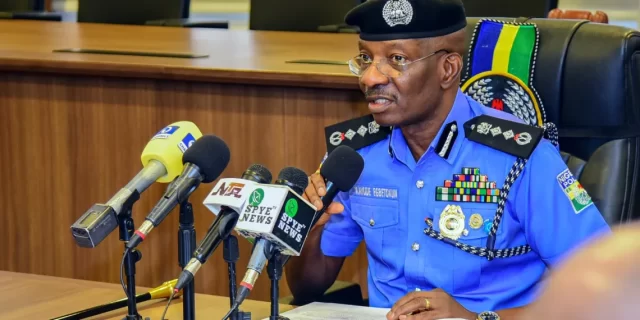The Inspector-General of Police (IGP), Kayode Egbetokun, has issued a directive banning police officers from carrying assault rifles while dressed in civilian attire (mufti).
This move aims to enforce professionalism, protect human rights, and prevent abuses by law enforcement personnel.
During a virtual meeting with senior police officers, Egbetokun emphasized that all tactical squads must strictly adhere to standard operating procedures (SOPs) and wear their designated uniforms while on duty.
His statement, relayed by Force Public Relations Officer (FPRO) Olumuyiwa Adejobi, warned against human rights violations, noting that the police have received multiple complaints through official channels regarding misconduct by officers.
- Boko Haram IED Explosion on Borno Road Kills Eight, Wounds Others
- EFCC Opens Probe of 24 Nigerian Young Men Detained in Ghana over Suspected Cybercrimes
- Former CBN Governor Emefiele Attempts To Regain Forfeited Abuja Estate; Court Dismisses the Attempt
- King Sunny Ade’s House Divided as Daughter Alleges he has Been Kidnapped; Other Family Members Deny Claim
- You Can Gather All Governors But If Nigerians Reject You, it is Over — El-Rufai Tells Tinubu
- Woman Leaves Husband after Falling in Love with ChatGPT
The IGP also condemned the unauthorized transfer of cases without written approval, labeling it a violation that burdens the parties involved and delays justice. He instructed officers to maintain discipline and follow due process in handling cases.
This development follows long-standing concerns over police brutality in the country, particularly the excessive force used by officers, including the now-disbanded Special Anti-Robbery Squad (SARS), whose unlawful activities led to the #EndSARS protests.
Many SARS officers were known for carrying firearms while in plain clothes, a practice that contributed to widespread abuses and public distrust of the police.
The directive is part of ongoing efforts to restore the reputation of the Nigeria Police Force, which has faced criticism over human rights abuses and misconduct.
Despite repeated promises of reform, incidents of extrajudicial killings and unlawful detentions continue to raise concerns among human rights organizations.












